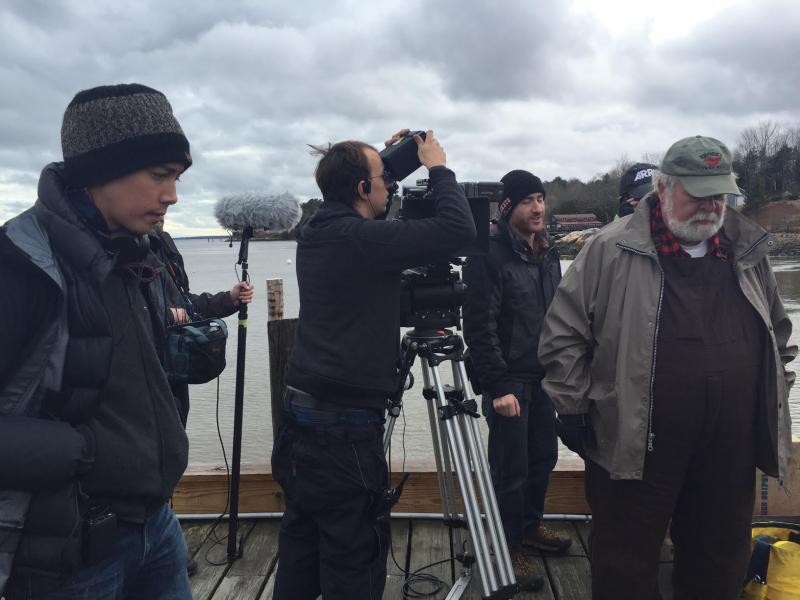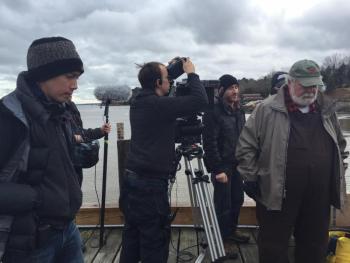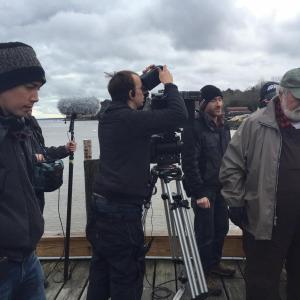Filmmakers push legislative bill to attract more film, TV productions to Maine
 Josh Gerritsen and crew on the set of the Maine-shot horror movie ‘Island Zero.’ (Photo courtesy Mariah Klapatch)
Josh Gerritsen and crew on the set of the Maine-shot horror movie ‘Island Zero.’ (Photo courtesy Mariah Klapatch)
 The reality is many Maine films have to be shot in Massachusetts or Canada. Photo courtesy MetroCreative
The reality is many Maine films have to be shot in Massachusetts or Canada. Photo courtesy MetroCreative
 Director Joel Strunk during the 5-week shoot of ‘Anatomy of The Tide’, also shot in Maine. (Photo courtesy Lottie Hedley and Anatomy of the Tide)
Director Joel Strunk during the 5-week shoot of ‘Anatomy of The Tide’, also shot in Maine. (Photo courtesy Lottie Hedley and Anatomy of the Tide)
 Sissy Spacek and Tom Wilkinson in a scene from the film ‘In the Bedroom’, shot in Maine. (Photo courtesy Strand Theatre)
Sissy Spacek and Tom Wilkinson in a scene from the film ‘In the Bedroom’, shot in Maine. (Photo courtesy Strand Theatre)
 Holly Star crew filming. Photo courtesy Erik Van Wyck
Holly Star crew filming. Photo courtesy Erik Van Wyck
 Josh Gerritsen and crew on the set of the Maine-shot horror movie ‘Island Zero.’ (Photo courtesy Mariah Klapatch)
Josh Gerritsen and crew on the set of the Maine-shot horror movie ‘Island Zero.’ (Photo courtesy Mariah Klapatch)
 The reality is many Maine films have to be shot in Massachusetts or Canada. Photo courtesy MetroCreative
The reality is many Maine films have to be shot in Massachusetts or Canada. Photo courtesy MetroCreative
 Director Joel Strunk during the 5-week shoot of ‘Anatomy of The Tide’, also shot in Maine. (Photo courtesy Lottie Hedley and Anatomy of the Tide)
Director Joel Strunk during the 5-week shoot of ‘Anatomy of The Tide’, also shot in Maine. (Photo courtesy Lottie Hedley and Anatomy of the Tide)
 Sissy Spacek and Tom Wilkinson in a scene from the film ‘In the Bedroom’, shot in Maine. (Photo courtesy Strand Theatre)
Sissy Spacek and Tom Wilkinson in a scene from the film ‘In the Bedroom’, shot in Maine. (Photo courtesy Strand Theatre)
 Holly Star crew filming. Photo courtesy Erik Van Wyck
Holly Star crew filming. Photo courtesy Erik Van Wyck
Maine is a filmmaker’s dream with its rugged coastline, diverse terrain, a pool of talent, and mystique. So why aren’t more movies and television shows shot here?
This has been the frustration of many producers and filmmakers who find that the state’s current tax incentive is too paltry, considering other states and Canadian provinces can provide more financial incentives to shoot movies and television productions there.
According to the Maine Film Office, the state currently only offers a 10-to-12 percent wage rebate back to financiers for employees who work on a film in Maine, with an additional five percent tax credit for any production costs in Maine. However, that five percent is essentially worthless if a production has no tax liability.
For more than two decades, Maine citizens and filmmakers have been trying to get bills passed into law in an attempt to increase film incentives up to at least 25 percent, on par with Massachusetts’ incentives—where many Maine-centered films are typically shot—and for various reasons, these efforts have largely failed.
Rep. John Picchiotti (R-Fairfield) has an interesting answer for why that is. In the past decade, he’d sponsored two bills to boost the state’s film incentives, only to see them both die in the Appropriations Committee.
“The problem we had all along is that the state’s static software was restricted, and antiquated,” said Picchiotti. “Any time you put a bill like this into the budget, all the software would do is show the money going out, not the money coming in. To update the software would have cost the state a million and a half dollars. And the state told us they couldn’t afford it.”
Picchiotti said he found a solution that could have worked.
“Just before I left office in 2018, I was working with a group called REMI, who could have fixed that software problem for around $200,000 to $300,000,” he said. “But, nothing was ever done about it.”
Picchiotti said the state’s Appropriations Committee knew about the problem. They also understood the economic benefits of bringing productions into Maine, but in the end, when the tax incentive numbers got crunched into the state’s budget, without any context, “it threw the budget completely off,” he said.
Despite these past speedbumps, Erik Van Wyck, a producer and actor in the 2018 film, Holly Star, shot in Biddeford and Saco, is working with an effort called Picture Maine to pass a new film incentive bill through the Maine Legislature.
The bill, L.R. 1105, is titled “An Act to Promote Economic Development Through Increased Film Incentives.”
Beyond the issue of the state’s antiquated software, Van Wyck said other misconceptions have contributed to the failure of past film incentive bills. Having learned from what failed to resonate with lawmakers in the past, Picture Maine’s bill has been crafted with specific goals in mind: to benefit working Mainers, not Hollywood actors.
Misconception 1: Film Incentives Only Benefit Out-Of-State Talent
Van Wyck said that there is a persistent misconception amongst taxpayers and the Maine Legislature that filmmakers only want to boost the state’s economic incentives to benefit the filmmakers themselves.
“There is sort of a stigma attached to it, like, ‘Why should we fund your creative dreams when there are larger issues we need to deal with?” said Van Wyck. “People who only see film as a creative endeavor don’t see it as a profitable industry.”
According to Picture Maine, the new bill “ensures that Maine taxpayers are not subsidizing the salaries of high-profile Hollywood producers, directors, actors, writers or from away.”
“It has no above-the-line incentive for people who don’t live here to work on a film,” he said. “Only the actors, writers, and directors whose wages would be incentivized, would be for people who live in Maine.”
Pointing to Governor Mill’s Strategic 10-Year Plan, which looks to attract new talent and promote innovation among other endeavors, Van Wyck said bringing film and TV productions to Maine aligns perfectly with the 10-Year-Plan’s vision.
Todd Gabe, a UMaine professor of economics, published a study in 2013 on film and TV’s impact on the Maine economy. Analyzing data from 2010, Gabe discovered that companies bringing film, television and photography projects into Maine directly supported 1,698 jobs. This was a combination of people working full- or part-time for companies and those who were self-employed. Together, they provided an estimated $19.6 million in labor income.
The bill aims to keep as much revenue generated from film in Maine as possible, and as Gabe’s 2013 study showed, it has a multiplier effect on Maine’s economy.
“Each film and television show is a temporary, independent small business that hires 100-150 people,” said Van Wyck. “In Maine’s economy with seasonal workers, gig workers, and a lot of entry-level workers who have easily translatable skills to a film set, you’re looking at benefiting a lot of local vendors, especially in the leisure and hospitality industries, which are suffering right now in a pandemic. Film is an industry that could easily gain a lot of those jobs back because it relies so heavily on restaurants, hotels, bars, transportation—it’s all good for this state.”
Misconception 2: Filmmaking Can’t Happen in a Pandemic
‘I’ll refute anyone who says that this is bad timing for a bill like this. I think it’s perfect timing.’
—Erik Van Wyck
Numerous film and television shows are currently working around the pandemic, with precautions in place.
“Their productions are going; they’re adding extra quarantine days and everyone is doing multiple COVID tests throughout,” said Van Wyck. “They’ve got medical workers who now have extra employment. You have extra hotel rooms being bought up because of the pandemic; workers who are making extra wages. So, the film incentive bill is no different than The Maine Seed Capital Tax Credit Program or the FAME program, which incentivizes other small businesses.”
Attracting Smaller Budget Films, Not Blockbusters
What Van Wyck and Picture Maine are proposing through this bill is to bring smaller, independent productions to Maine in the $5–$8 million range, not the big, blockbuster $100 million movies.
“In our bill, there is a per-production cap, so at a certain point, it won’t make sense for an $8 million-film to come here as they wouldn’t get the rate of return they’d get from other states’ incentives,” he said. “By year six of the bill, we would no longer incentivize reimbursement for any crew from away, meaning, for a production to maximize a 100 percent rebate, all the crew would have to live year-round in Maine.”
Currently, Maine offers wage reimbursement to production companies at 12 percent for residents and 10 percent for non-residents. This bill would make Maine more competitive to attract film companies with the proposed change of wage reimbursement at 25 percent for residents and 20 percent for non-residents.
“This bill is all about jump-starting the economy in an industry that we know works,” said Van Wyck. “As a filmmaker myself, I couldn’t care less about how this benefits me. This is a jobs creation bill through and through.”
As someone who has lived and worked in Los Angeles and moved to Maine, Van Wyck said there is something else that people don’t understand until they actually live here year-round. “Maine is a much less cynical population than LA, New York City, or even Atlanta. People are much more welcoming here. When we shot Holly Star in Maine, it was in the middle of the winter. And everyone who interacted with us was just so welcoming, and happy.”
For more information about Picture Maine see attached PDF or contact their email.
Related: When movie stars come to Maine they stay here
Related: Maine in the movies: 35 films where Maine was the third character
Kay Stephens can be reached at news@penbaypilot.com
Event Date
Address
United States































